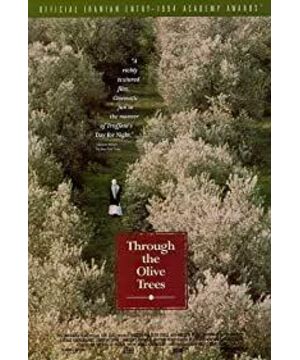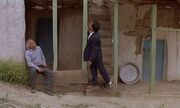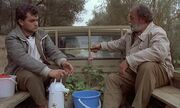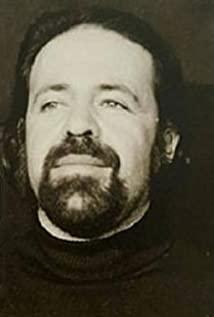Abbas's Village Trilogy: "Where Is My Friend's Home", "Life and Flow" and "The Lover Under the Olive Tree", while showing Abbas's affectionate humanistic care for his hometown, through the blurring of reality and images The boundaries, the construction and deconstruction of the realism of the film in the form of pseudo-records, are an interesting experiment on the nature of the image.
In the interpretation of Abbas by contemporary movie fans, most of them cannot avoid realism, which reflects the social reality of Iran, humanistic care, and beautiful pastoral vistas, etc. However, very few people interpret Abbas from the perspective of Abbas' experiment in film structure. Bass, the king of the film industry, Godard shouted after watching "The Lover under the Olive Tree": The movie ends with Abbas. This is the most appropriate footnote to Abbas' films. If his films rely solely on the affectionate humanistic care, they will never be able to enter Godard's "eyes".
It can also be seen from the above point of view that Abbas' attitude towards life and movies, so the structure and structure of the authenticity of images in his movies are ultimately attributed to life and are realistic. "Where Is My Friend's Home", as the first of the trilogy, tells the simple story of a little boy who is afraid of being scolded by his teacher because of his friend's homework and tries to find his friend's home. Asking people for directions, repeatedly running and searching between different villages, depicts the loss of children's right to speak in the Iranian patriarchal (also with theocratic) society and the children's pure psychological motivation, and ends with a little flower caught in the homework. Affectionate humanistic care is undoubtedly revealed.
In the second "Life and Life", Abbas fictionalized himself as the hero of the film and the director of "He" "Abbas No. 1". He starred in "He" because he was worried about the earthquake in Iran. "The little boy, then drove his son to the countryside after the earthquake to find the little male protagonist. The film uses a semi-documentary style image to show the world the unyielding and open-mindedness of the Iranian people in the face of disasters, especially a young lover who has lost most of his relatives, still insists on holding a wedding to smooth out the disaster. At the same time, beckoning to a new life is the most touching, and the behavior change of Abbas No. 1 at the end also reflects the eternal beauty of human nature in Abbas' films.
In "Life", Abbas No. 1 took out the poster of "He" many times and asked about the whereabouts of the little boy. While emphasizing "He" as a realistic film, it also completely destroyed the record quality it showed. , making it completely reduced to a "movie", and together with the setting of this film, it completes the deconstruction of the authenticity of "He"; the definition of the role of the little boy's movie, while deconstructing "He", also reinforces The realism of this film builds the real level of "Life" on the basis of the false level of "He", which makes this film show a record quality, making the audience believe that Abbas No. 1 in the film is Abbas himself; At the end of the film, Abbas No. 1 did not find the little boy. Can it be understood as another deliberate blurring of the boundary between reality and image by Abbas? In the final chapter "The Lover Under the Olive Tree", Abbas once again fabricated himself. As "Abbas No. 2", he accidentally heard the story of the lovers in "Life", so he decided to shoot A film about them, the filming process of this film is the content of this film "Olive", and the final film is the second "Life and Flow", where Abbas completed the ultimate Iranian nesting doll, Completely subvert and deconstruct the sense of reality created by the first two films: the director of "Olive" Abbas No. 2 Abbas No. 1 fictionalized, that is, the director of "Olive" is "actually" from "Sheng" The male protagonist Abbas No. 1 (the exchange of identities between directors and actors in different situations is also one of the themes of Abbas' films, see the masterpiece "Close-Up"), he used "Olive" to shoot the work "Life", It is also completely reduced to a "movie" after "He". After deconstructing the first two films, Abbas successfully painted the real layers of Olive on the false layers of Sheng and He, creating the strongest real/record texture in the trilogy, and in the In this film, "in reality" is deliberately arranged (the quotes in reality here are because this reality is the reality in the film) the husband cannot participate in the role because of illness, and the plot of using someone else to play the role of the husband further weakens the harmony Strengthen the authenticity of "Sheng" and "Olive", so that the content of this film, that is, the shooting process of "Sheng", is shown in the form of a documentary. In "Olive", the actor of the husband is in "reality" to the actor of the wife (that is to say, the actor of the wife is not the wife of the sick original male No. 1, which implies that the couple may be in real reality. It does not exist at all, and it completely shatters the sense of reality brought by "Sheng".) Early feelings of love and pursuit in "reality" are not only the romance of this film, but also the way Abbas wants to enhance the dramatic effect. A trick added to further enrich the authenticity of Olive in the traditional "play within play" structure,
The most interesting thing is that at the end of the film, Abbas also did not give a clear answer to whether Hussein was chasing the beautiful woman (the long shot at the end of the situation is also beautiful and poetic), which is similar to the end of "Life and Flow". There are similarities in purpose. Looking at the end of the trilogy, only the realistic theme "Where Is My Friend's Home" gives a clear ending. The ending of "The Lover" is unclear, which is the best proof that Abbas keeps blurring the boundaries between reality and images. No wonder it forced Wang Gao to shout: The movie ends with Abbas!
View more about Through the Olive Trees reviews








